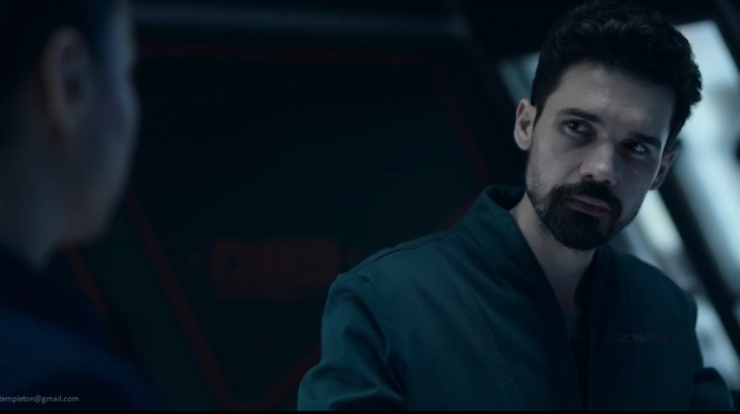“It feels kinda nice, huh? Everyone being on the same side for once?”
It would feel nice, wouldn’t it? But we’re not there yet, no matter what the friendly resupply guy says to the Roci’s crew. There’s a war on, out in space, and even within the confines of our beloved ship there’s tension and anxiety—and now, to add further stress to the situation, an unexpected mission specialist arrives to take over the Azure Dragon operation.
It’s pretty clear who’s coming aboard, but spoilers follow!
This episode was written by Daniel Abraham and Ty Franck, which is always good, but especially interesting when you consider the specific changes they’ve made from their book. On the page, the idea of the human-interest news pieces doesn’t come until later; Holden is on Ceres and starts making little videos about Belters, partly to demonstrate their humanity to his bigoted father.
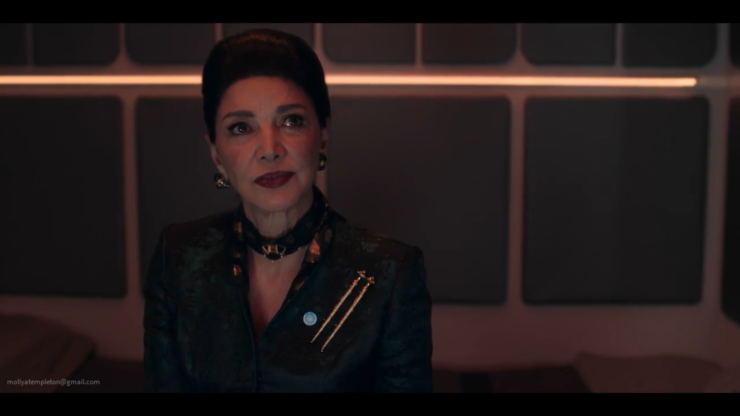
Here, Avasarala ropes Monica in to start telling stories about Earthers—to go behind the statistics on the numbers of lives lost, and put a “human face” on the tragedy on Earth. Monica resists—“I have credibility that state media doesn’t have, and you’d like to exploit it”—but Avasarala probably knew she would, and she lays on the guilt, suggesting that if Monica says no, she’ll have to wonder if every attack was one she could have stopped.
One of the episode’s greatest exchanges follows:
“Wow, you give a really good guilt trip.”
“I practice a lot when I am alone.”
This change makes a ton of sense: There’s no time to spend on Earth, in this short season. (Babylon’s Ashes begins with Pastor Anna and her partner on Earth, dealing with food shortages and injuries in the aftermath of Marco’s initial attack.) It’s easy, when almost every scene is set aboard a spaceship or space station, to forget the devastation taking place on the planet. Belters are represented in force on the show; it’s Earthers we don’t see much of.
(And Martians, but their grand project is basically dead in the wake of the gates opening.)
It’s also wise to have Avasarala suggest these human interest stories. On the surface, the very idea might seem contrary to her usual no-bullshit, get-shit-done tactics. But from the very beginning, Avasarala has been extremely good at people. Her maneuvering, from the very first season, is artful and sly and yes, sometimes she messes up, but who doesn’t? She knows this war isn’t just fought in the vacuum of space. She wants to win some hearts and minds, and she will use whatever tools are at her disposal to do so. And Monica, dogged and clever, is a very good tool. Avasarala also just about takes Monica’s head off when the journalist interrupts her during the hunt for the Azure Dragon, and Avasarala certainly knows that snapping at her was a mistake. Letting Monica see her anger and anxiety in that moment gives the younger woman power that Avasarala deftly takes back when she asks Monica to do this work for her.
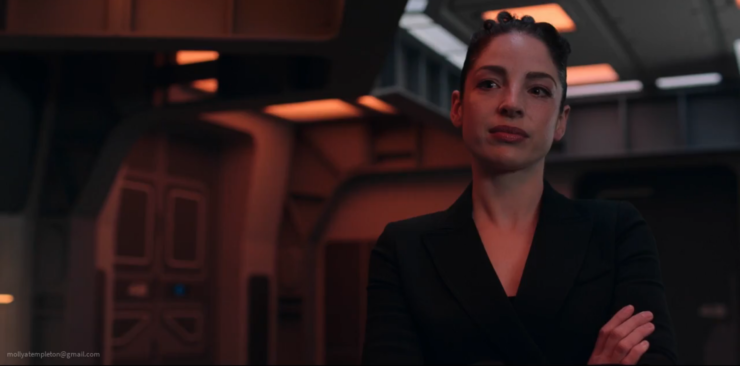
There are also changes to the Azure Dragon sequence, but they serve to effectively streamline both the scene and the aftermath. With the Roci undamaged, there’s no need to get her fixed up. There’s no time for a pit stop in a six episode season!
What I love about this whole sequence—beyond the stressful and elaborate maneuvering—is how much it says about power, command, partnerships, and where the Roci crew comes from. Holden was in the Earth navy once, but not for long. None of them are soldiers like Bobbie is. Holden is the captain, but it’s a job, like being engineer or mechanic. What he says to Bobbie about Clarissa’s presence on the ship is telling: “Amos trusts her, and I trust him, and this is our ship, so that’s the end of it.”
Our ship. He’s in charge, and that’s his job. But it’s all of their ship. And while they work for Avasarala sometimes, they aren’t used to being directly under someone else’s command, even when that someone is a friend. Bobbie comes in, steps on everyone’s toes, and expects them all to get in line and do the job. She talks about Belters as if they are the enemy, which they are—but Naomi is a Belter. Bobbie’s response to Amos saying he wants a suit of power armor is almost cruel. Her role in this war is very different from the one the Roci’s crew has been playing, and that’s apparent in how she commands.
But when she’s right, she doesn’t gloat about it. Once they catch the Dragon, teamwork kicks in: Clarissa takes over when Naomi is paralyzed, then saves Bobbie; Bobbie takes the ailing Clarissa back to the ship while Holden and Amos finish the op.
Everyone, as this plays out, has a moment of control, and a moment when they need help or are worried about someone else—a moment that might be considered weakness. But it’s not weakness; it’s humanity. Not even power armor is infallible. Nor Clarissa’s mods. Holden is distracted by what happens with Naomi, and Amos worries about Peaches. The sequence’s string of actions, kindnesses, and mistakes is precise and elegant, sharply written by the authors and directed by Jeff Woolnough (who’s directed almost a dozen Expanse episodes since “Remember the Cant” in season one).
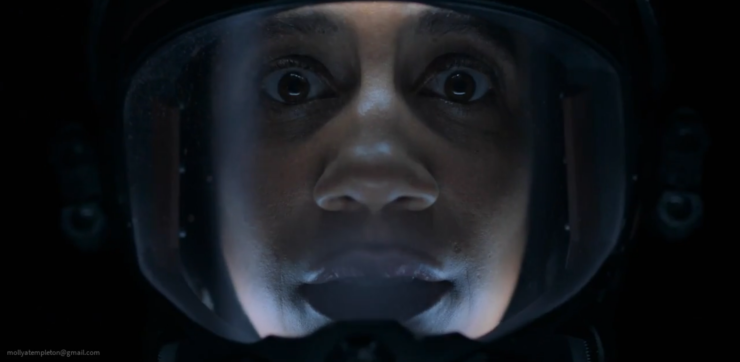
While Naomi’s moment of freezing up is a short one, it’s really important. This is a woman who grew up in space, who has probably done more spacewalks than we Earthers can even get our heads around. Going “outside” in the vacuum is as normal to her as walking outside under the sky is to us. But a traumatic experience, like her escape last season, can undo the meaning of “normal.” She simply can’t take that step. She’s not okay. And she’s not ready to talk about it. (That was also a very good exchange.)
The entire Azure Dragon sequence demonstrates the reality of interplanetary cooperation, as opposed to the dream; there’s so much to overcome, so many norms and personalities and expectations and assumptions that go into every choice and every move. But in the end, bumpy as the operation is, it turns up something incredibly valuable: the chart showing all the rocks Marco is throwing, or will throw, at Earth. That chart is terrifying. And it gives the Inners a chance to finally get off their heels.
But they’re not the only ones about to take the fight to Marco. On the Tynan, Drummer is about to entrust Michio to a Golden Bough captain who has also—sort of—broken ties with Marco (he’s not hunted by the Free Navy, just reduced to doing shit jobs for them). Everyone is deeply wary of each other at first; there’s a considerable bounty on Drummer’s head, and she makes every choice with her family’s safety in the forefront of her mind.
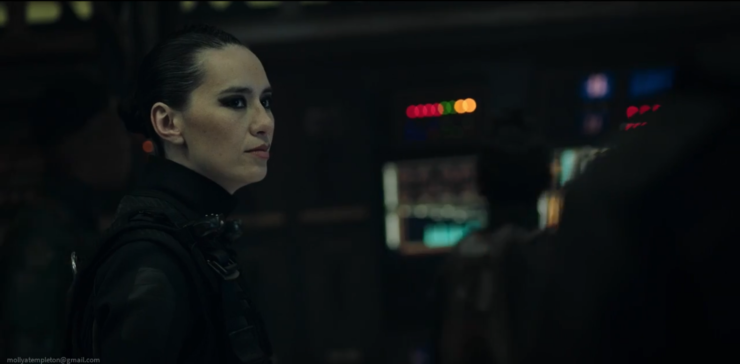
Watching her and Liang Walker (Stuart Hughes) do a little dance of trust and intel around each other is an absolute delight. He wants a tour of Ashford’s famous ship; she declines the request, unwilling to have someone she doesn’t trust aboard. But then he offers up something very useful, letting her know that he knows where Marco’s supply depots are, and she sees an opening. No one says anything overt until they’ve established, carefully, that they’re on the same page, and that others may be on this page with them. And then? Then it’s time to be pirates. Time to “snatch the food right off Marco’s table. Like a true pirate would.”
This is how to hit a Belter like a Belter: take away his supplies. And they don’t even know how obsessed Inaros is with getting those supplies to Medina Station. But if he can’t offer protection (because he has to fight off the Inners’ fleet) and he can’t offer supplies (because Drummer and Walker and friends are lifting them), what will he have to offer the Belt?
The way Drummer and Walker talk is almost an entirely different language than the one Marco speaks with Rosenfeld—and to Filip. Power allows people to say what they mean. Even Rosenfeld, who’s “new here,” speaks her mind to Marco, and the way she does so suggests that maybe being new allows her a certain brazenness that the rest of his team may no longer have. Her tough-love suggestions are terrible, and yet I definitely get the feeling that everything she says has something else hiding behind it.
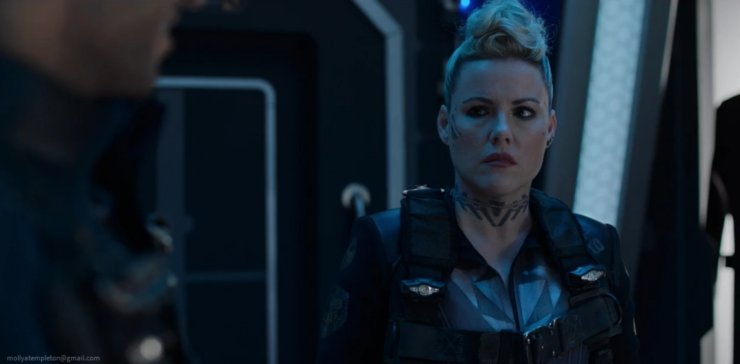
Marco won’t be bossed around, as is made clear when he overrules the station administrator who wants to keep Filip in jail. (This is also a very clear indicator that Marco believes he’s above the law.) Rosenfeld tells him to do a terrible thing; he does a less terrible thing. When Filip comes to Rosenfeld, wanting to send a tribute to Yoan’s family, she walks the party line, parroting Marco’s lie about Yoan assaulting a superior officer. But it seems like she does it to test Filip: How will he respond? Will he play the game? Will he push back or walk away? And when she relents, saying she’ll have supplies sent in tribute, is that also part of the game? Will she do anything? Or did she just want to let Filip think he’d done something right?
Marco does not think Filip has done anything right. His little tirade to his son is both understandable and exhausting, a classic of generational conflict the universe over: You don’t know how hard I had it! I had to walk all over the spaceship uphill both ways! He’s not wrong that Filip is enjoying a level of privilege that Marco did not have, but Marco conveniently ignores the fact that Filip is largely doing what he’s learned from watching his father, which is to say, whatever he wants, without consequence.
But Filip is not his father—and meeting his mother had some effect on him. He clearly feels guilty about killing Yoan, and he very clearly does not have the emotional skills to know what to do with that guilt. He’s getting a lot more screen time than I might have expected, and it’s making me wonder if the writers are going to tie up his story a little differently than they did on the page.
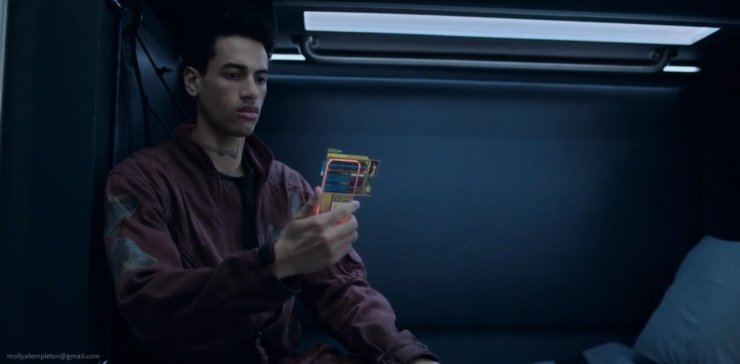
Marco’s tirade to his son is also a reminder of where Marco comes from—that whatever his failings are, to all appearances he has built the Free Navy from very little, and he took the fight to the Inners like no one previously dreamed or dared. What isn’t as clear is how much his success has to do with luck (getting his hands on the protomolecule) and the fact that his plans aligned with the unseen Winston Duarte’s (Duarte wanted the protomolecule, Marco needed Duarte’s powerful Martian ships). He says he’ll be ready for the Inners, who are “sentimental” about Ceres. Are they, though? Or do they just have a very good opening now that rocks aren’t flying at their faces?
Every single scene this week is on a spaceship except for the Laconian prologue, which continues the story of poor Cara, the dead sunbird, and the definitely-not-a-dog Cara meets in the woods. There’s a lot going on under the surface, in the tension her parents have about the meeting they have to go to; the tension between Cara and her parents, when she insists Laconia is home; and the reminder that other worlds are not our own, and things really don’t work the same way there.
I think this is all Strange Dogs is going to do this season—play out at the top of each episode, a little teaser of what could be, should anyone pick up the last three books of the series for adaptation. And that’s probably enough, though of course I wish for more. It’s a clever narrative choice, a way to connect these six seasons of the show to anything that might happen in the future. With only four episodes left, we can’t have it all: protomolecule resolution, Laconia, and closure with Marco (along with a lot of other things I won’t go into because spoilers).
But what we’re getting is a taut, carefully plotted final arc that contains everything that makes this show tick: character-driven, technically vivid science fiction that never forgets that no matter how far we scatter across the stars, we’re still human, with all our flaws and foibles and imperfect hearts. The Expanse is brilliant for a lot of reasons, but the one that always stands out to me is its marriage of massive scale—the ring gates! The builders! The dark lights in the gates!—with the intimacy of a character study. I’m going to miss every one of this crew when they’re gone.
SPACE FLOTSAM AND JETSAM
- Holden’s really hanging on to that weird transit/missing ship thing, just enough to keep it in our minds.
- “Marco Inaros doesn’t like me. I intimidate him. Sexually.” This is not where I expected this sentence to go. Stuart Hughes as Liang Walker is great, and his name, it’s worth noting, is a mashup of two OPA faction heads from the books: Liang Goodfortune and Carlos Walker.
- Clarissa tearing up after Holden chews her out—because he finally called her part of the crew—is extremely perfect. This episode maybe didn’t have enough Amos, but there is a lot going on.
Molly Templeton lives and writes in Oregon, and spends as much time as possible in the woods. Sometimes she talks about books on Twitter.










